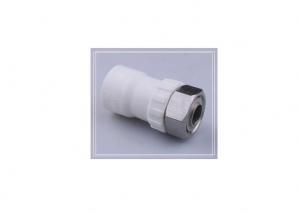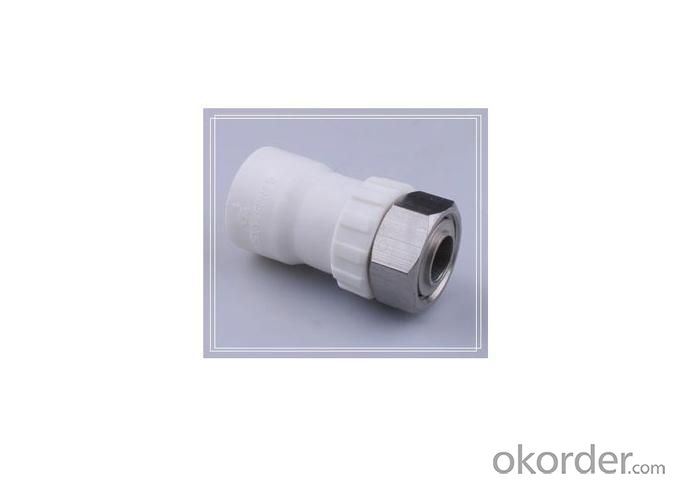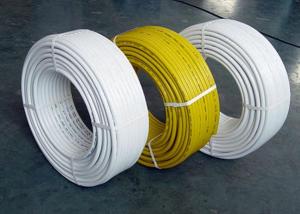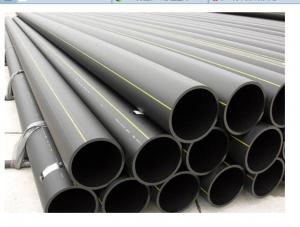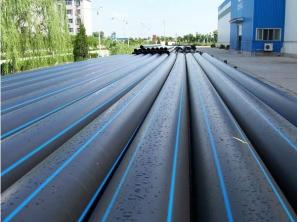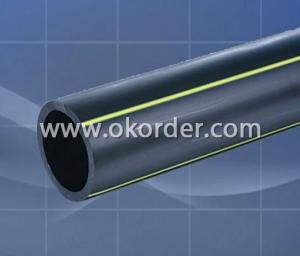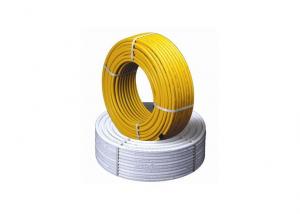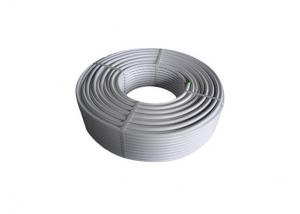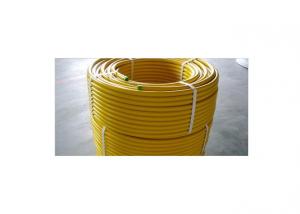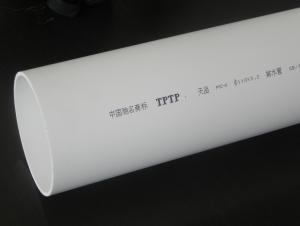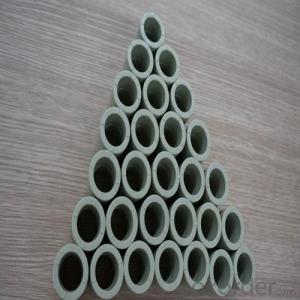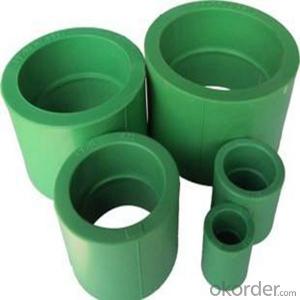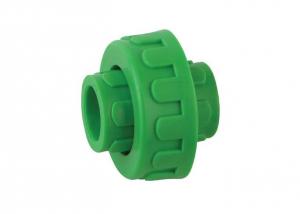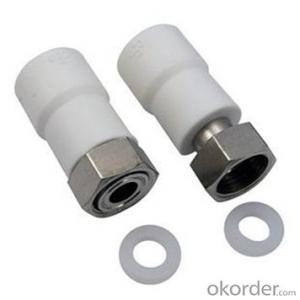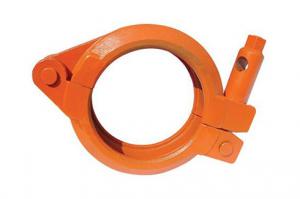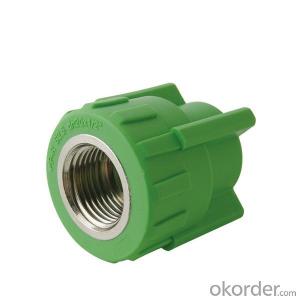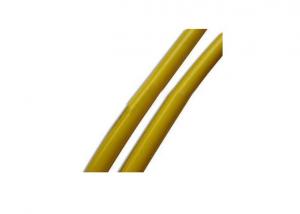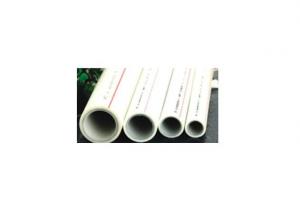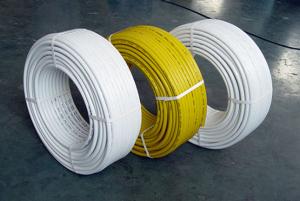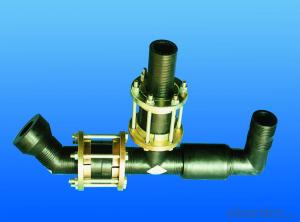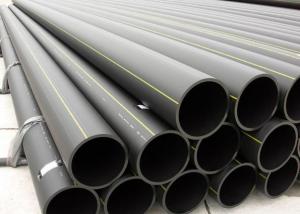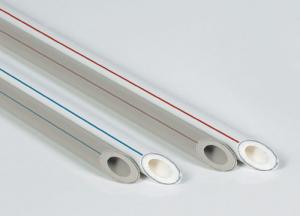Composite PPR Pipe Fitting Coupling Union
- Loading Port:
- China Main Port
- Payment Terms:
- TT or LC
- Min Order Qty:
- 500 Pieces pc
- Supply Capability:
- 100000 Pieces per Day pc/month
OKorder Service Pledge
OKorder Financial Service
You Might Also Like
PPR Pipe Fitting Coupling Union
Certificate: CE; ISO9001
Pressure: PN2.5Mpa
Size: 20-32 mm
Colors: on request
15 years experience in PP-R line
Features of PPR Pipe Fitting Coupling Union:
Material: Polypropylene
Sizes: 20 to 32 mm
Pressure: PN2.5Mpa
Colors: Light grey, white or other colors on request
Connection: Welding
Standard: GB/T18742.2-2002; DIN8077/8078
Certification: CE, ISO9001
Applications: Cold or hot water supply, heating system, wall heating and radiating system
Advantages of PPR Pipe Fitting Coupling Union:
High Temperature Resistance: the maximum sustained working temperature is up to 70 °C,the maximum transient temperature is up to 95°C
Non-toxic: no heavy metal additives, would not be covered with dirt or contaminated by bacterium.
Corrosion Resistant: resist chemical matters or electron chemical corrosion.
Lower Installation Costs: light weight and ease of installation can reduce installation costs
Higher Flow Capacity: smooth interior walls result in lower pressure loss and higher volume
Long Life: more than 50 years under normal conditions
Recycled and Environment-friendly
PP-R Pipe Fittings:
Name | Specification | Weight | Package | |
(piece) | (g) | pcs/bag | pcs/ctn | |
PP-R Coupling Union | 20*1/2"F | 64 | 50 | 300 |
25*3/4"F | 112 | 25 | 175 | |
32*1"F | 170 | 20 | 120 | |
- Q: Are composite pipes resistant to freezing?
- Yes, composite pipes are resistant to freezing.
- Q: Are composite pipes suitable for power generation facilities?
- Yes, composite pipes are suitable for power generation facilities. Composite pipes offer numerous advantages such as high strength, corrosion resistance, and lightweight construction, making them ideal for various applications in power generation facilities. They can effectively transport fluids, withstand high pressure and temperature conditions, and reduce the risk of leakage or failure. Additionally, composite pipes have a longer lifespan and require less maintenance compared to traditional materials, resulting in cost savings and improved operational efficiency for power generation facilities.
- Q: Are composite pipes suitable for oil and gas refineries?
- Yes, composite pipes are suitable for oil and gas refineries. Composite pipes offer numerous advantages such as excellent corrosion resistance, high strength-to-weight ratio, and durability, making them ideal for transporting various fluids, including oil and gas, in refinery operations. Their lightweight nature allows for easier installation, maintenance, and reduced transportation costs. Additionally, composite pipes can withstand extreme temperatures and pressure, ensuring the safe and efficient flow of oil and gas within the refineries.
- Q: Can composite pipes be used for firefighting systems?
- Yes, composite pipes can be used for firefighting systems. Composite pipes offer excellent resistance to corrosion, are lightweight, and have high strength properties, making them suitable for use in firefighting systems. They can effectively transport water or other fire suppression agents, ensuring the reliability and efficiency of the firefighting system.
- Q: Can composite pipes be used for hot water applications?
- Yes, composite pipes can be used for hot water applications. Composite pipes are specifically designed to withstand high temperatures and can effectively handle hot water without any issues.
- Q: Are composite pipes suitable for railway infrastructure?
- Yes, composite pipes are suitable for railway infrastructure. Composite pipes offer numerous advantages such as lightweight yet durable construction, corrosion resistance, and flexibility. These characteristics make them ideal for various applications in railway infrastructure, including water supply, drainage, and cable protection systems. Additionally, composite pipes are easy to install, require minimal maintenance, and have a longer lifespan compared to traditional materials, making them a reliable choice for railway infrastructure projects.
- Q: Can composite pipes be used for chemical manufacturing processes?
- Yes, composite pipes can be used for chemical manufacturing processes. Composite pipes are known for their excellent resistance to corrosion, chemicals, and high temperatures, making them suitable for handling various chemicals and substances used in manufacturing processes. Additionally, their lightweight nature and high strength-to-weight ratio make them easier to install and maintain, providing durability and cost-effectiveness in chemical manufacturing operations.
- Q: Are composite pipes suitable for offshore drilling platforms?
- Yes, composite pipes are suitable for offshore drilling platforms due to their corrosion resistance, lightweight nature, and high strength-to-weight ratio. These pipes can withstand harsh marine environments, reduce maintenance costs, and offer improved durability compared to traditional metal pipes. Additionally, composite pipes are easier to install and transport, making them a favorable choice for offshore drilling operations.
- Q: Are composite pipes suitable for chemical storage tanks?
- Yes, composite pipes are suitable for chemical storage tanks. Composite pipes are made of materials such as fiberglass or carbon fiber reinforced polymers, which provide excellent resistance to chemicals, corrosion, and impact. These pipes also have high strength-to-weight ratios and are highly durable, making them ideal for storing various chemicals in tanks. Additionally, composite pipes offer low maintenance requirements and can withstand extreme temperatures, further enhancing their suitability for use in chemical storage tanks.
- Q: Can composite pipes be used for industrial waste disposal?
- Yes, composite pipes can be used for industrial waste disposal. Composite pipes are highly durable, corrosion-resistant, and have excellent chemical resistance, making them suitable for handling various types of industrial waste. They can effectively handle the corrosive nature and high temperatures often associated with industrial waste, providing a reliable and long-lasting solution for waste disposal in industrial settings.
1. Manufacturer Overview
| Location | Zhejiang, China |
| Year Established | 2004 |
| Annual Output Value | |
| Main Markets | North America South America Eastern Europe Southeast Asia Africa Oceania Mid East Eastern Asia Western Europe |
| Company Certifications | CE;ISO9001:2000 |
2. Manufacturer Certificates
| a) Certification Name | |
| Range | |
| Reference | |
| Validity Period |
3. Manufacturer Capability
| a) Trade Capacity | |
| Nearest Port | |
| Export Percentage | 31% - 40% |
| No.of Employees in Trade Department | |
| Language Spoken: | |
| b) Factory Information | |
| Factory Size: | 10,000-30,000 square meters |
| No. of Production Lines | 6 |
| Contract Manufacturing | OEM Service Offered Buyer Label Offered |
| Product Price Range | |
Send your message to us
Composite PPR Pipe Fitting Coupling Union
- Loading Port:
- China Main Port
- Payment Terms:
- TT or LC
- Min Order Qty:
- 500 Pieces pc
- Supply Capability:
- 100000 Pieces per Day pc/month
OKorder Service Pledge
OKorder Financial Service
Similar products
Hot products
Hot Searches
Related keywords
